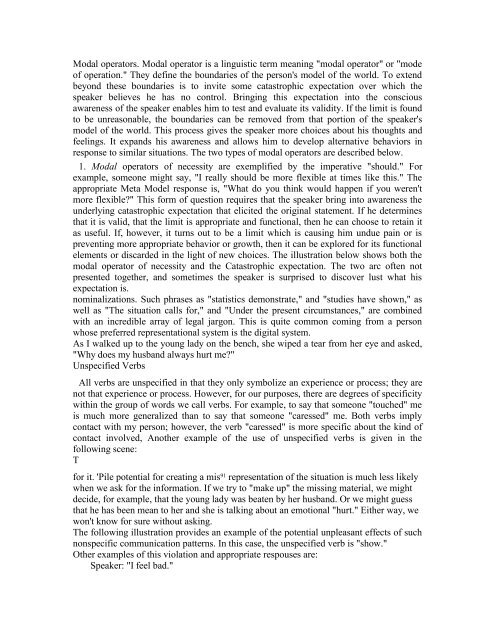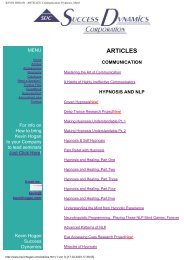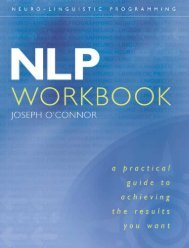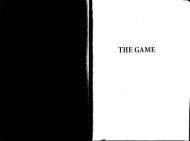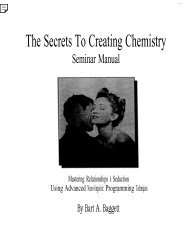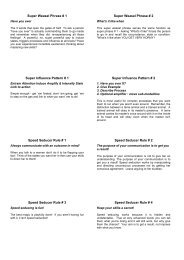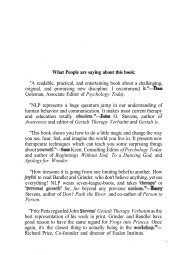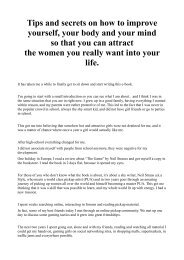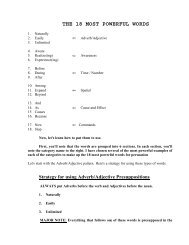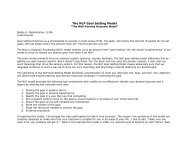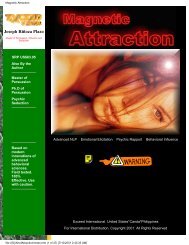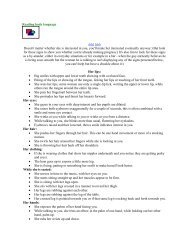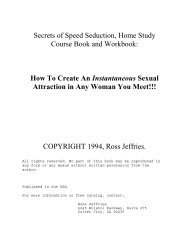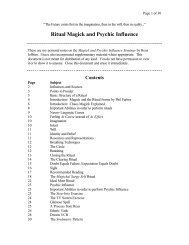A Pragmatic Guide To Communication & Change.pdf - NLP Info Centre
A Pragmatic Guide To Communication & Change.pdf - NLP Info Centre
A Pragmatic Guide To Communication & Change.pdf - NLP Info Centre
- No tags were found...
Create successful ePaper yourself
Turn your PDF publications into a flip-book with our unique Google optimized e-Paper software.
Modal operators. Modal operator is a linguistic term meaning "modal operator" or "mode<br />
of operation." They define the boundaries of the person's model of the world. <strong>To</strong> extend<br />
beyond these boundaries is to invite some catastrophic expectation over which the<br />
speaker believes he has no control. Bringing this expectation into the conscious<br />
awareness of the speaker enables him to test and evaluate its validity. If the limit is found<br />
to be unreasonable, the boundaries can be removed from that portion of the speaker's<br />
model of the world. This process gives the speaker more choices about his thoughts and<br />
feelings. It expands his awareness and allows him to develop alternative behaviors in<br />
response to similar situations. The two types of modal operators are described below.<br />
1. Modal operators of necessity are exemplified by the imperative "should." For<br />
example, someone might say, "I really should be more flexible at times like this." The<br />
appropriate Meta Model response is, "What do you think would happen if you weren't<br />
more flexible?" This form of question requires that the speaker bring into awareness the<br />
underlying catastrophic expectation that elicited the original statement. If he determines<br />
that it is valid, that the limit is appropriate and functional, then he can choose to retain it<br />
as useful. If, however, it turns out to be a limit which is causing him undue pain or is<br />
preventing more appropriate behavior or growth, then it can be explored for its functional<br />
elements or discarded in the light of new choices. The illustration below shows both the<br />
modal operator of necessity and the Catastrophic expectation. The two arc often not<br />
presented together, and sometimes the speaker is surprised to discover lust what his<br />
expectation is.<br />
nominalizations. Such phrases as "statistics demonstrate," and "studies have shown," as<br />
well as "The situation calls for," and "Under the present circumstances," are combined<br />
with an incredible array of legal jargon. This is quite common coming from a person<br />
whose preferred representational system is the digital system.<br />
As I walked up to the young lady on the bench, she wiped a tear from her eye and asked,<br />
"Why does my husband always hurt me?"<br />
Unspecified Verbs<br />
All verbs are unspecified in that they only symbolize an experience or process; they are<br />
not that experience or process. However, for our purposes, there are degrees of specificity<br />
within the group of words we call verbs. For example, to say that someone "touched" me<br />
is much more generalized than to say that someone "caressed" me. Both verbs imply<br />
contact with my person; however, the verb "caressed" is more specific about the kind of<br />
contact involved, Another example of the use of unspecified verbs is given in the<br />
following scene:<br />
T<br />
for it. 'Pile potential for creating a mis 91 representation of the situation is much less likely<br />
when we ask for the information. If we try to "make up" the missing material, we might<br />
decide, for example, that the young lady was beaten by her husband. Or we might guess<br />
that he has been mean to her and she is talking about an emotional "hurt." Either way, we<br />
won't know for sure without asking.<br />
The following illustration provides an example of the potential unpleasant effects of such<br />
nonspecific communication patterns. In this case, the unspecified verb is "show."<br />
Other examples of this violation and appropriate respouses are:<br />
Speaker: "I feel bad."


